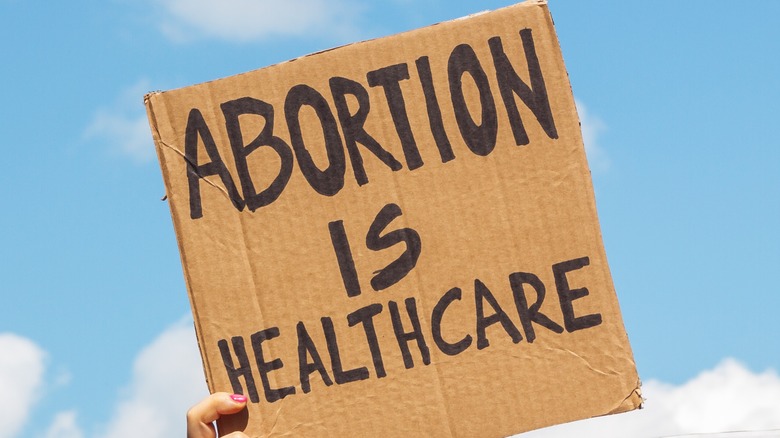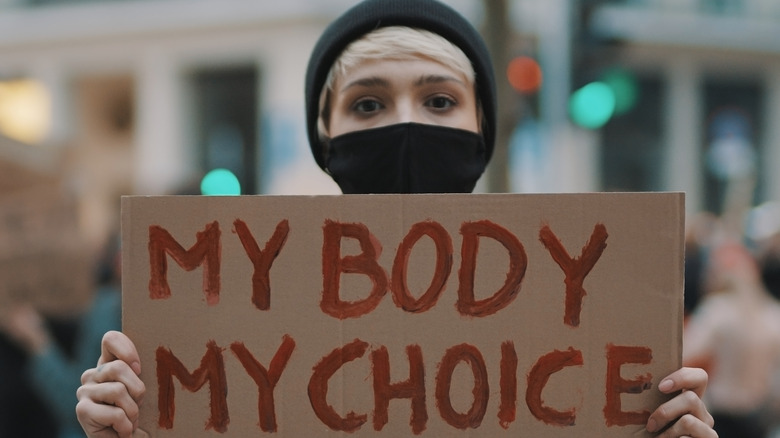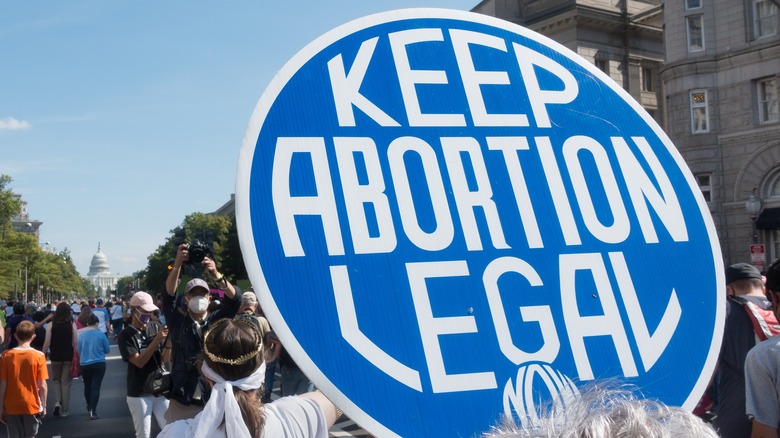Why Some Doctors Feel 'Muzzled' Following State Abortion Bans
In the wake of the overturning of Roe v. Wade, a lot has changed across the United States — and not for the better. As of October 2, 2022, abortion is officially banned in 13 states, with Georgia instating a six-week ban (via The New York Times). But whether it's a total ban or a six-week ban, lawmakers behind these decisions reject the fact that abortion can be a life-saving procedure.
"Every year there are women who would have died within days or even hours from pregnancy complications," Michigan-based OB-GYN Dr. Lisa Harris told NPR. "Those can be things like someone is hemorrhaging, or someone is septic, meaning they have an infection that may have started in their uterus, but it's spread to their whole body, and their organs are beginning to fail. And for conditions that are not specific to pregnancy but that pregnancy can make worse, it could be things like a massive blood clot in someone's lungs or severe heart failure."
In other words, those who might not want to terminate a pregnancy sometimes need an abortion to save their lives. However, in states where abortion is banned, people aren't usually allowed abortion access even if it could save their life or allow for a future healthy pregnancy.
Across the U.S., doctors are seeing the repercussions of pregnancies gone wrong when abortion is denied. Many of those doctors want to speak out but are finding it's not easy to share stories of what they're seeing behind hospital doors.
Doctors are fearful of losing their jobs
As more doctors witness the aftermath of Roe v Wade being overturned, it's hard for many to stay silent. From stories of people traveling from out of state to obtain an abortion where it's still legal, to patients suffering for days or weeks due to life-threatening emergencies in states where abortion isn't legal, doctors have a lot to say. "Literally, we've had to watch patients deteriorate in front of our eyes," a Texas obstetrician told CNN anonymously to protect her job.
When she inquired if she could speak to journalists, her place of employment warned her not to say where she worked. "I think we're all pretty scared," she said. "I'm afraid of losing my job. I'm the primary breadwinner in my family, so losing my job would be a big, big deal."
CNN spoke to eight doctors who were all told they could only speak about abortion as private citizens, not as doctors, and they couldn't say where they worked. "I feel muzzled," said one. "I feel completely restrained, and I'm outraged."
"Laws restricting or banning or limiting or giving waiting limits for when those people can have abortions are cruel," OB-GYN Dr. Erin Berry told the Idaho Capital Sun. Berry has performed abortions on cancer patients. If one's cancer requires chemotherapy, chemo can't be administered during the first trimester of a pregnancy (via the American Cancer Society).
These stories need to be told.
Doctors are fearful of legal action
Even in situations where the fetus won't survive outside the womb, is no longer viable, or the mother is physically suffering, places like Kentucky don't allow abortion. If a physician were to perform an abortion in Kentucky under any of these circumstances, they could end up being prosecuted for a felony, heavily fined, and/or imprisoned (via Bloomberg).
"We've taken the Hippocratic oath to do no harm," OB-GYN Dr. Melissa Simon told ABC News. "I do not — nor do my patients want me to — stop what I'm doing and think about what the judge would do: 'Will the judge sentence me to jail if I were to perform an abortion?'"
Even performing an abortion on someone from out of state can be risky for doctors. Because of this, states like Connecticut have instituted abortion shield laws. These laws protect healthcare providers from being sued or prosecuted by a state where abortion is banned if they perform a procedure on a resident of that state (via The New York Times). It's a step in the right direction, but not all states protecting access to abortion have abortion shield laws yet.
As more states plan to restrict abortion or outright ban it, the fight for autonomy for those with uteruses and doctors who want the truth told will become not just more important, but more complicated. It will also mean that even more physicians are likely to feel scared and muzzled.


